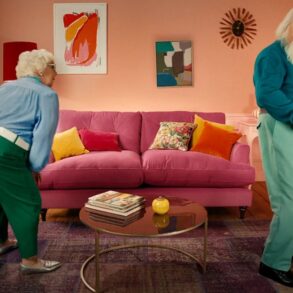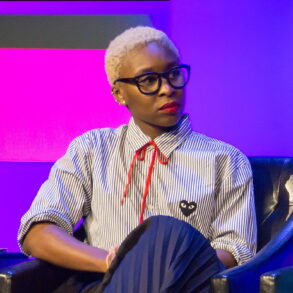For most of her life, LaShawna Moyle’s long, lustrous hair was an important part of her identity.
As a biracial woman, she wanted to respect Black culture and that included her thick, curly hair.
LaShawna Moyle talks about the reasons for holding an event like the Power of Hair Expo in honor of Black History Month at Western Iowa Tech C…
Once she entered her 40s, Moyle began to realize how expensive and time-consuming it was to maintain her mane. Plus, it could be stiflingly hot to have that much hair in the summertime. Also, let’s get real: forget about spending any relaxing time in a swimming pool because frizzy hair quickly becomes tangled hair when wet.
“There came a point in my life when I wanted my self-identity to evolve,” she explained. “Despite more than a few tears shed, I finally decided it was time to cut my hair.”
Moyle, coordinator of inclusivity excellent for Western Iowa Tech Community College (WITCC), is using her own personal story as a starting point for the 4647 Stone Ave. college’s second annual “The Power of Hair Expo,” taking place from 11 a.m. to 1 p.m. Feb. 15 at the Dunker Center.
People are also reading…
The event, which is in honor of February being Black History Month, is being billed as a way to address what hair means inside and outside of the Black community.
Scissors, hair picks and products are shown to symbolize hair in the Black community. So are children’s books dealing with Black hair. All wil…
When a symbol of pride comes with a cost
“Hair is a centerpiece of Black culture,” Moyle said. “It’s a symbol of identity, of resistance, creative expression and freedom.”
While Black hair has always had a unique place in the history and legacy of Blackness in America, it had always come at a cost.
For instance, the Black hair care industry is worth more than $2.5 billion, with Black women spending two-to-six times as much on hair care than their white counterparts.
Even significant was a 2023 research study conducted by the personal care product company Dove, which discovered Black women’s hair is more than two times likely to be perceived as unprofessional.
Indeed, approximately two-thirds of Black women said they have changed their hair to go to a job interview. Among them, 41 percent said they changed their hair from curly to straight.
Western Iowa Tech’s LaShawna Moyle explained hair is a centerpiece of Black culture. The cultural, societal, economical and aesthetics of Blac…
Getting to the ‘roots’ of the matter
According to this survey, around 25 percent of Black women believed they were denied a job interview because of their hair.
Moyle said “The Power of Hair Expo” will be a safe place where such issues can be discussed.
“For far too long, we’ve kept these kinds of discussions under wrap,” she explained. “Because of that, people began to think such incidents were singular. Instead, they were always universal.”
Western Iowa Tech Community College diversity, equity and inclusion coordinator LaShawna Moyle talks about the facts of hair discrimination an…
Changing perceptions at the earliest stages
Even young children can be singled out due to their hair.
“Last year, we placed an emphasis on talking to young girls about their hair,” Moyle said, pointing towards popular kids books like “Hair Love” and “Bedtime Bonnet” as popular reading material for Black children. “Kids need to feel represented. That has always been a struggle for Black girls when to comes to their hair.”
A survey conducted in 2021 reported that 100 percent of Black elementary school girls, attending majority-white schools who report hair discrimination, state they experienced discrimination by the age of 10.
While the same study reports that 90 percent of Black girls believe their hair is beautiful, microaggression and discrimination can have a detrimental and long-lasting impact.
In fact, trauma from such experiences can cause girls to miss days from schools.
“Teenage Black girls can miss up to a week worth of school due to hair dissatisfaction,” Moyle said.
Think it is solely a female problem? Well, guess again. Black boys can also experience hair trauma.
“During our first year, we thought the hair expo was way too woman-centric,” Moyle said. “This time around, we’re opening it up to everyone.”
Which is why she wanted the “Power of Hair Expo” to be held on a college campus with a diverse students body from across the country and around the world.
“Unless they have access to a car, (WITCC) students might feel isolated from a community,” Moyle said. “They may not have people to identify with or they may not even know they’re are hairdressers who specialize in Black hair around town.”
After her 40th birthday, Western Iowa Tech’s LaShawna Moyle decided to cut her long, curly hair for a shorter ‘do. According to Moyle, Black h…
What is good hair and bad hair?
Despite that, some attitudes exist within and outside of the Black community.
Specifically, to have “good hair” generally meant having straight hair or hair that was closer to people of European descent.
By straying away from that common aesthetic can have consequences on the lives of people, socially, economically and politically.

In Black culture, hair is a symbol of identity, resistance, creative expression and freedom. It can also lead to discrimination and microaggression, according to Western Iowa Tech’s LaShawna Moyle. Both the good sides and bad sides of Black hair will be discussed at the second annual Power of Hair Expo, Feb. 15 at WIT’s Dunker Center.
A crown-ing achievement
In 2019, Dove and the CROWN Coalition created the Creating an Respectful and Open World for Natural Hair (CROWN) Act.
Partnering with a California State Senator, the CROWN Act fought to ensure protection against discrimination based on race-based hairstyles by extending statutory protection to hair texture and protective styles such as braid, twists and knots in the workplace and in public schools.
“People are still being sent home from work or from school activities due to their hair,” Moyle said. “That was wrong in the past and it is wrong now.”
These hair picks were a gift to participants at last year’s Power of Hair Expo in honor of Black History Month at Western Iowa Tech Community …
Connecting hair with cultural identity
In addition to being a forum for heathy discussion, the “Power of Hair Expo” is also a celebration of Black hair in all shapes, lengths and textures.
“For people in the Black community, hair and identity are inseparable,” Moyle said. “It connects us to our cultural identity and notions of beauty.”
That was the case with Moyle, who admitted it took her some time to get used to her new, short hairdo.
“My hair makes me feel good and it is a way that I want to represent myself to the world,” she said with a confident smile. “This is who I am today.”
North High School ProStart culinary program students, Jesstina Henry, Leah Laird and Emma Bayona, take a break from making grilled cheese sandwiches Friday, Feb. 2, 2024, to talk about competing at a state ProStart cake decorating contest later this month in Des Moines.
The Journal’s Jared McNett shows how to download and browse the Sioux City Journal’s app.
This post was originally published on this site be sure to check out more of their content.






